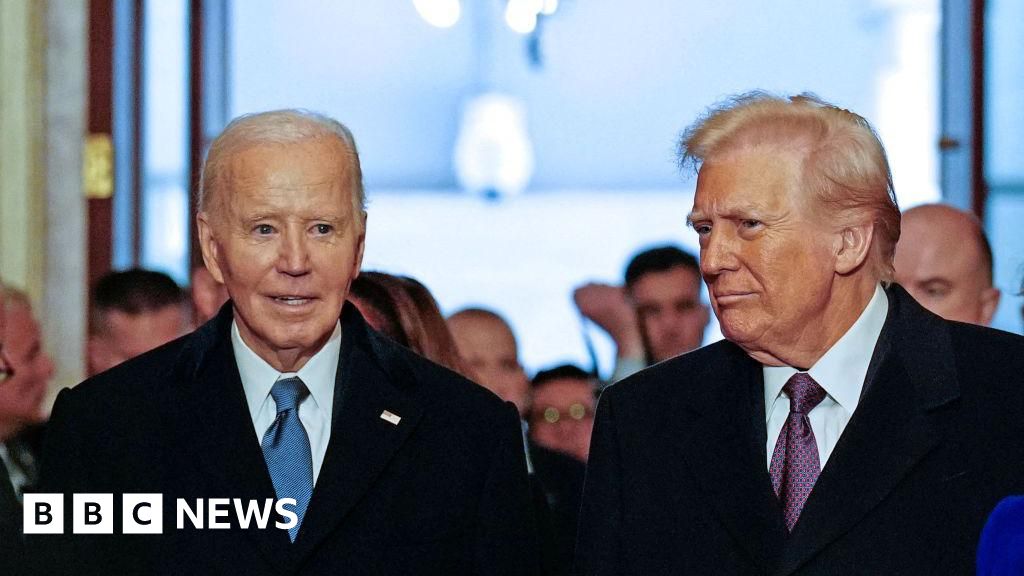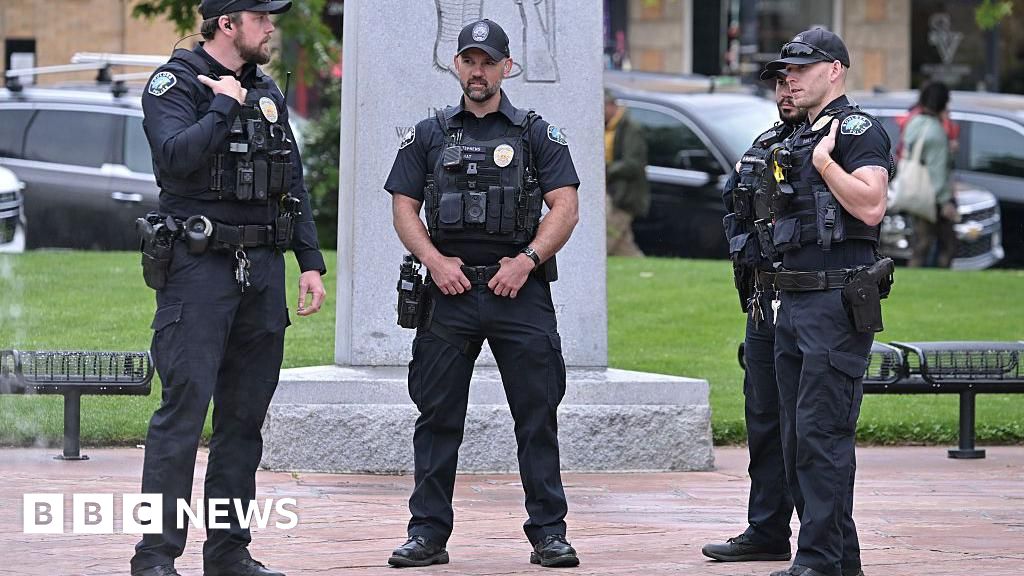ARTICLE AD BOX
 Image source, AFP via Getty Images
Image source, AFP via Getty Images
Former President Donald Trump chose not to attend this week's Republican debate
By Kayla Epstein
BBC News, Georgia
This week, a group of young Republicans gathered at a bar to watch their party's first presidential debate.
There was plenty of conservative zeal in the air, enhanced throughout the night with a steady stream of beer and feisty exchanges from the candidates on television. But among the dozens of attendees, there was not a single scarlet "Make America Great Again" baseball cap in sight, nor any telltale imagery associated with Donald Trump.
Given his continued grip on the Republican party, such an omission would have been unusual at most other Republican events.
But this particular one took place in Georgia - specifically, the Atlanta metro area.
Republican politicians across the nation, particularly in Washington DC, have stuck by Mr Trump over fears that breaking from him would damage their standing with the party's base. He remains so popular that even many of Mr Trump's rivals are afraid to alienate voters with direct attacks on his record or character.
But in Georgia, many Republicans now believe the opposite - that failing to move past Mr Trump's 2020 election falsehoods will do nothing but lose them statewide elections for the foreseeable future.
A good share blame him for humiliating losses to Democrats in the 2020 presidential election and 2022 Senate race in the state. A fresh indictment for Mr Trump has turned Georgia into the latest epicenter of his ongoing legal battles.
Through careful statements and actions, Georgia's Republican leaders appear to be positioning themselves as a blueprint for what a post-Trump conservative movement could look like. And many Republican voters are willing to pivot along with them.
"It's the fact that the electorate really doesn't want to keep talking about the past, they want to talk about the future," said Martha Zoller, a longtime Republican commentator in Georgia.
Though she could not speak for the Republican leadership in the state, "within the grassroots I would say people are really looking at other candidates".
Multiple attendees interviewed at the Atlanta Young Republicans watch party this week said they were open to alternatives to Mr Trump. More than anything, they wanted a candidate who was electable both in their state and in the coming general election.
Young Georgia Republican voters are looking for electability
"I'm looking to see if any of the candidates will be able to leave an impression that would compel anyone to vote for them rather than Trump," said Dave Mulligan, a 25-year-old from Roswell. "I'm coming in open-minded."
Ron DeSantis, Mr Trump's main but still-trailing rival for the GOP nomination is "way more electable" nationwide, David Dal Porto, 23, believed.
Mitchell Nemeth, another young Republican, said his choice was "definitely not Trump" and it was time for "someone younger" to lead the party.
Those telltale "MAGA" hats, beloved by Mr Trump's fanbase, were no longer considered fashionable among this crowd, one attendee explained to the BBC mid-debate.
It's not just Georgia Republicans' youngest members willing to move away from the former president.
All month, the Republican governor, Brian Kemp, has delicately - but deliberately - criticised Mr Trump.
"The 2020 election in Georgia was not stolen," he tweeted in response to Mr Trump's Georgia indictment. "The future of our country is at stake in 2024 and that must be our focus."
At an Atlanta conservative forum that took place days after the indictment, he told the crowd: "The Democrats want us to be focused on things like this, so we're not focused on Joe Biden's record," he said.
The governor even traveled to Milwaukee for the first Republican presidential debate. He called Mr Trump's absence on the debate stage a "big mistake" on the conservative Ruthless podcast.
This political high wire act has not cost the state's Republican officials so far, even as Mr Trump has attacked them and endorsed some of their more right-wing opponents. In fact, they have only grown in stature.
Mr Kemp won a landslide re-election in 2022 against a popular Democratic opponent, Stacey Abrams, and is building a national profile.
Secretary of State Brad Raffensberger, the recipient of a now infamous phone call from Mr Trump urging him to "find" enough votes for him to win the state, trounced his Democratic own opponent in last year and may soon aspire to higher office.
Mr Trump continues to lead presidential primary polls, and does have serious support from staunch conservatives in the state.
Watch: Trump surrenders at Georgia jail...in 74 seconds
"The radical left is turning America into a police state against conservatives," former US Senator Kelly Loeffler, who now leads a Republican get-out-the-vote effort in Georgia, tweeted in response to Mr Trump's indictment.
Dozens of Mr Trump's supporters rallied outside the Fulton County jail ahead of his booking on Thursday, making a raucous scene and waving signs in support of their leader.
But at least in Georgia, their opinion may no longer be the dominant one.
"I think within the Republican groups I am a member of, you probably have 30 to 35% that are still Trump supporters," Ms Zoller said. "And then the rest of the people are looking at other options."

 1 year ago
36
1 year ago
36








 English (US) ·
English (US) ·